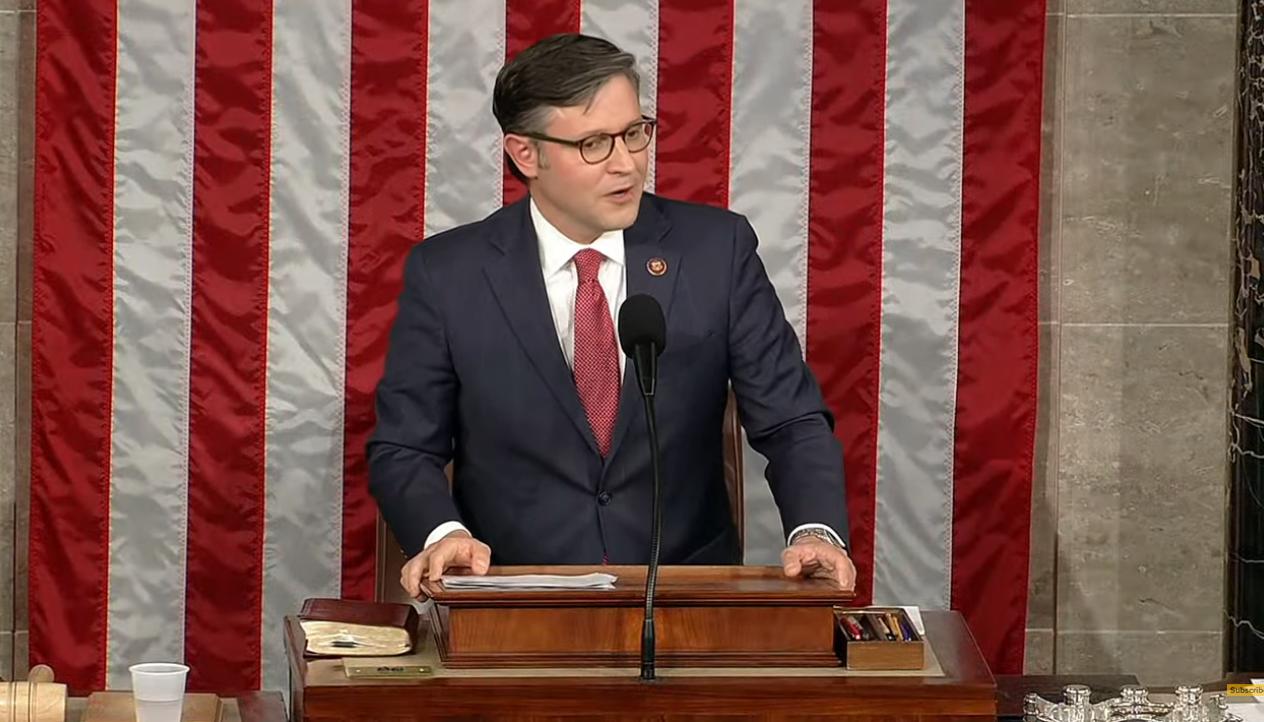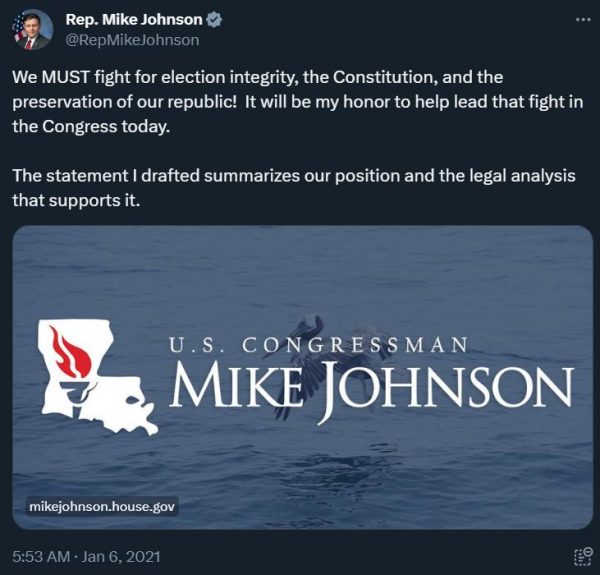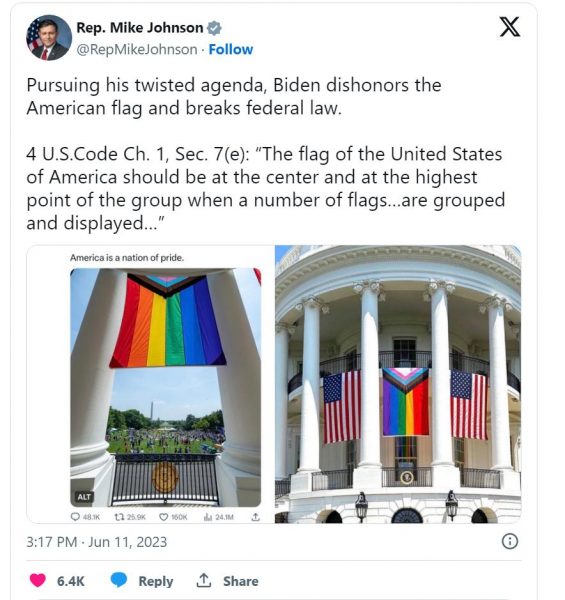Congress
Mike Johnson elected next House speaker
La. Republican opposes LGBTQ rights, abortion

After three weeks of House Republican infighting to select a new speaker to replace ousted U.S. Rep. Kevin McCarthy (R-Calif.), the GOP majority voted U.S. Rep. Mike Johnson (R-La.) to take up the gavel Wednesday.
Johnson, who received 220 votes, three more than required to be elected speaker, has a long record of opposition to LGBTQ equal rights and holds pro-life anti-choice views
He is a longtime supporter of former President Donald Trump, who during the Capitol insurrection on Jan. 6, 2021, expressed solidarity with the rioters who invaded the building that morning and promised to take their efforts to Congress later in the day.
“We must fight for election integrity, the constitution and the preservation of our republic! It will be my honor to help lead that fight in the Congress today,” Johnson tweeted.

Johnson led the amicus brief signed by more than 100 House Republicans in support of a lawsuit filed by Texas Attorney General Ken Paxton, seeking to invalidate the 2020 election results in four swing states won by President Joe Biden: Georgia, Michigan, Pennsylvania and Wisconsin.
He is vice chairman of the Republican conference, an assistant whip for House Republicans, a member of the Judiciary Committee, the Armed Services Committee and a member and former chairman of the Republican Study Committee.
Axios reported the team of former U.S. Rep. Liz Cheney (R-Wyo.), a driving force of the House Jan. 6 committee and an outspoken Trump critic, released old videos highlighting Johnson’s involvement, as well as a quote in the New York Times that called him “the most important architect of the Electoral College objections,” NBC reports.
Anti-LGBTQ record
Johnson previously served as a senior attorney and spokesperson for the Alliance Defending Freedom and continues to act as an ADF allied attorney in Congress. The ADF is a self-labeled “legal alliance of Christian attorneys” with a history of funding and representing cases targeting LGBTQ people, youth and protections.
It is listed as an anti-LGBTQ hate group by the Southern Poverty Law Center, which also notes ADF’s efforts against abortion access.
While an attorney at ADF, Johnson received the “Family, Faith and Freedom Award” from the Family Research Council, a Southern Poverty Law Center-designated anti-LGBTQ hate group.
While serving at ADF, Johnson filed preemptive lawsuits in nine states in 2014 on behalf of Christian vendors who objected to marriage equality. Johnson also led the ADF’s campaign against GLSEN’s anti-bullying Day Of Silence.
Prior to his election to the House, Johnson served in the Louisiana State Legislature from February 2015 to January 2017, where in 2015 he introduced the Marriage and Conscience Act a virulently anti-LGBTQ bill that would have explicitly allowed discrimination against same-sex couples.
In 2018, he joined in with anti-LGBTQ former TV actor and evangelical Kirk Cameron in Cameron’s attempt to persuade Louisiana lawmakers to allow Christian prayer in the state’s public schools.
In December 2022 Johnson introduced a federal “Don’t Say Gay” bill.
In June 2023, the now speaker-elect posted a since-deleted tweet claiming that it was illegal to fly a rainbow flag at the White House.

Congress
Congress passes ‘Big, Beautiful Bill’ with massive cuts to health insurance coverage
Roughly 1.8 million LGBTQ Americans rely on Medicaid

The “Big, Beautiful Bill” heads to President Donald Trump’s desk following the vote by the Republican majority in the U.S. House of Representatives Thursday, which saw two nays from GOP members and unified opposition from the entire Democratic caucus.
To partially offset the cost of tax breaks that disproportionately favor the wealthy, the bill contains massive cuts to Medicaid and social safety net programs like food assistance for the poor while adding a projected $3.3 billion to the deficit.
Policy wise, the signature legislation of Trump’s second term rolls back clean energy tax credits passed under the Biden-Harris administration while beefing up funding for defense and border security.
Roughly 13 percent of LGBTQ adults in the U.S., about 1.8 million people, rely on Medicaid as their primary health insurer, compared to seven percent of non-LGBTQ adults, according to the UCLA School of Law’s Williams Institute think tank on sexual orientation and gender identities.
In total, the Congressional Budget Office estimates the cuts will cause more than 10 million Americans to lose their coverage under Medicaid and anywhere from three to five million to lose their care under Affordable Care Act marketplace plans.
A number of Republicans in the House and Senate opposed the bill reasoning that they might face political consequences for taking away access to healthcare for, particularly, low-income Americans who rely on Medicaid. Poorer voters flocked to Trump in last year’s presidential election, exit polls show.
A provision that would have blocked the use of federal funds to reimburse medical care for transgender youth was blocked by the Senate Parliamentarian and ultimately struck from the legislation — reportedly after the first trans member of Congress, U.S. Rep. Sarah McBride (D-Del.) and the first lesbian U.S. senator, Tammy Baldwin (D-Wis.), shored up unified opposition to the proposal among Congressional Democrats.
Congress
Ritchie Torres says he is unlikely to run for NY governor
One poll showed gay Democratic congressman nearly tied with Kathy Hochul

Gay Democratic Congressman Ritchie Torres of New York is unlikely to challenge New York Gov. Kathy Hochul (D) in the state’s next gubernatorial race, he said during an appearance Wednesday on MSNBC’s “Morning Joe.”
“I’m unlikely to run for governor,” he said. ““I feel like the assault that we’ve seen on the social safety net in the Bronx is so unprecedented. It’s so overwhelming that I’m going to keep my focus on Washington, D.C.”
Torres and Hochul were nearly tied in a poll this spring of likely Democratic voters in New York City, fueling speculation that the congressman might run. A Siena College poll, however, found Hochul leading with a wider margin.
Back in D.C., the congressman and his colleagues are unified in their opposition to President Donald Trump’s signature legislation, the “Big Beautiful Bill,” which heads back to the House after passing the Senate by one vote this week.
To pay for tax cuts that disproportionately advantage the ultra-wealthy and large corporations, the president and Congressional Republicans have proposed massive cuts to Medicaid and other social programs.
A provision in the Senate version of the bill that would have blocked the use of federal funds to reimburse medical care for transgender youth was blocked by the Senate Parliamentarian and ultimately struck from the legislation, reportedly after pressure from transgender U.S. Rep. Sarah McBride (D-Del.) and lesbian U.S. Sen. Tammy Baldwin (D-Wis.).
Torres on “Morning Joe” said, “The so-called Big Beautiful Bill represents a betrayal of the working people of America and nowhere more so than in the Bronx,” adding, “It’s going to destabilize every health care provider, every hospital.”
Congress
House Democrats oppose Bessent’s removal of SOGI from discrimination complaint forms
Congressional Equality Caucus sharply criticized move

A letter issued last week by a group of House Democrats objects to Treasury Secretary Scott Bessent’s removal of sexual orientation and gender identity as bases for sex discrimination complaints in several Equal Employment Opportunity forms.
Bessent, who is gay, is the highest ranking openly LGBTQ official in American history and the second out Cabinet member next to Pete Buttigieg, who served as transportation secretary during the Biden-Harris administration.
The signatories to the letter include a few out members of Congress, Congressional Equality Caucus chair and co-chairs Mark Takano (Calif.), Ritchie Torres (N.Y.), and Becca Balint (Vt.), along with U.S. Reps. Nikema Williams (Ga.), Hank Johnson (Ga.), Raja Krishnamoorthi (Ill.), Delia Ramirez (Ill.), Joyce Beatty (Ohio), Lloyd Doggett (Texas), Eleanor Holmes Norton (D.C.), Josh Gottheimer (N.J.), and Sylvia Garcia (D-Texas).
The letter explains the “critical role” played by the EEO given the strictures and limits on how federal employees can find recourse for unlawful workplace discrimination — namely, without the ability to file complaints directly with the Employment Opportunity Commission or otherwise engage with the agency unless the complainant “appeal[s] an agency’s decision following the agency’s investigation or request[s] a hearing before an administrative judge.”
“Your attempt to remove ‘gender identity’ and ‘sexual orientation’ as bases for sex discrimination complaints in numerous Equal Employment Opportunity (EEO) forms will create unnecessary hurdles to employees filing EEO complaints and undermine enforcement of federal employee’s nondiscrimination protections,” the members wrote in their letter.
They further explain the legal basis behind LGBTQ inclusive nondiscrimination protections for federal employees in the EEOC’s decisions in Macy v. Holder (2012) and Baldwin v. Foxx (2015) and the U.S. Supreme Court’s decision in Bostock v. Clayton County (2020).
“It appears that these changes may be an attempt by the department to dissuade employees from reporting gender identity and sexual orientation discrimination,” the lawmakers wrote. “Without forms clearly enumerating gender identity and sexual orientation as forms of sex discrimination, the average employee who experiences these forms of discrimination may see these forms and not realize that the discrimination they experienced was unlawful and something that they can report and seek recourse for.”
“A more alarming view would be that the department no longer plans to fulfill its legal obligations to investigate complaints of gender identity and sexual orientation and ensure its
employees are working in an environment free from these forms of discrimination,” they added.
-

 U.S. Supreme Court2 days ago
U.S. Supreme Court2 days agoSupreme Court to consider bans on trans athletes in school sports
-

 Out & About2 days ago
Out & About2 days agoCelebrate the Fourth of July the gay way!
-

 Virginia2 days ago
Virginia2 days agoVa. court allows conversion therapy despite law banning it
-

 New York5 days ago
New York5 days agoTwo teens shot steps from Stonewall Inn after NYC Pride parade












